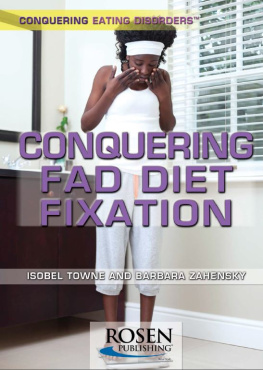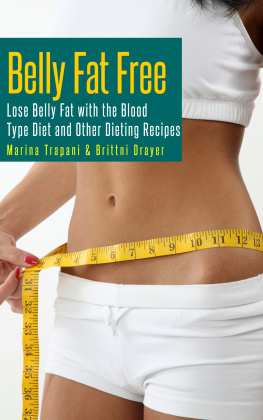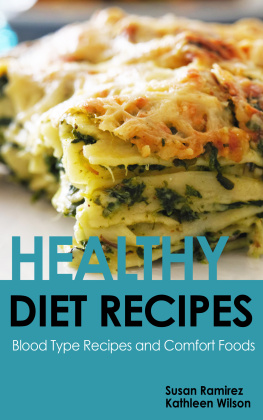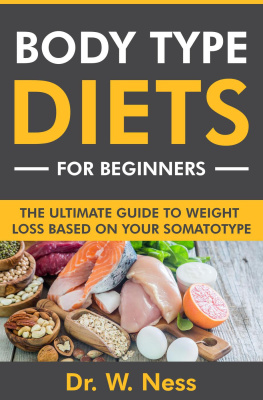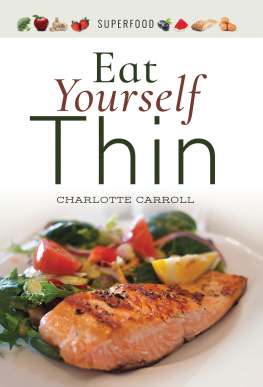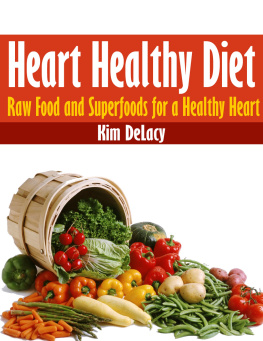

Published in 2016 by The Rosen Publishing Group, Inc.
29 East 21st Street, New York, NY 10010
Copyright 2016 by The Rosen Publishing Group, Inc.
First Edition
All rights reserved. No part of this book may be reproduced in any form without permission in writing from the publisher, except by a reviewer.
Library of Congress Cataloging-in-Publication Data
Towne, Isobel.
Conquering fad diet fixation / Isobel Towne and Barbara Zahensky.
pages cm. (Conquering eating disorders)
Audience: Grades 7 to 12.
Includes index.
ISBN 978-1-4994-6207-4 (library bound)
1. Reducing diets. 2. Eating disorders. 3. Weight loss. I. Zahensky, Barbara A. II. Title.
RM222.2.T678 2016 613.2'5dc23
2015016580
For many of the images in this book, the people photographed are models. The depictions do not imply actual situations or events.
Manufactured in the United States of America
CONTENTS

Teens may feel pressure from society about how their body should look, but their quest should be less about appearance and more about feeling healthy.
CHAPTER ONE
Healthy Weight and Healthy Body
M ost people want to be happy and healthy. Just about everywhere you look there are ads and articles about how to get fit fast. The Internet, television, and magazines often feature smiling models and actors who are very thin. In some cases, the models portray a body type that is simply not possible for most people. And unfortunately these images send a disturbing message to consumers of all ages: that they have to be skinny to be happy.
This idea about having a models body, along with the pressure from other teens, makes many young people feel that they must be thin. Sometimes this quest for thinness can lead to serious health problems. According to the National Eating Disorders Association, it is estimated that in 2011, as many as twenty million females and ten million males in the United States suffered from an eating disorder such as anorexia nervosa or bulimia nervosa. Furthermore, about 1 to 5 percent of the population was fighting a battle with binge eating disorder. According to the National Association of Anorexia Nervosa and Associated Disorders, men are far less likely to develop an eating disorder than women. Only 5 to 15 percent of those suffering from anorexia or bulimia are male. In general, however, the statistics on eating disorders are somewhat inaccurate because of the secretiveness of those with disordered eating behaviors and because doctors are not required to report eating disorders.
At the same time that extreme thinness has become so desirable in American society today, the average teen has become less active physically than in past generations. Most young people spend much more time watching television or playing video games. Many teens do not participate in any regular exercise program or team sport either at school or at home.
Watching What You Eat
When you dont burn calories with exercise, the only way to reduce weight is to eat less. As a result, countless articles, websites, and books discuss everything about dieting. Thousands of weight-loss centers (such as Weight Watchers and Jenny Craig) across the country offer methods or programs for losing weight.
Diets based on good nutrition can be helpful. And some well-established weight-loss plans are staffed by experts on health and nutrition and can be a source of support and help if you want to lose weight. But many are crash or fad diets, which are not only unhealthy but can be dangerous. A fad diet is a diet that is a craze that is followed with great enthusiasm by a lot of people for a short period of time. Fad diets focus on losing a lot of weight quickly. Unfortunately, they are not usually created by experts in nutrition but by people or companies who are only interested in making a quick dollar. They rely on peoples insecurity and negative feelings about themselves to sell ineffective diet books, prepared meals, or products for instant weight loss. These diets can injure your health and cause serious problems. If the diet seems too good to be true, it probably isnt a healthy one. For example, be wary of a diet that offers a significant weight loss by your eating as much of a certain food as you want or weight loss without any exercise. Use common sense when considering diet possibilities.

Healthy eating means basing what you eat on good nutrition. A balanced diet can help you on your way to getting to or keeping at a healthy weight.
It is important to learn ways to feel good about yourself and your body, how to eat only when you are hungry, and how to develop habits that will help you keep your weight under control for life.
Confidence
Many young people feel that losing weight will solve their problems. They think that once they lose weight, they will be accepted and make friends easily. These teens may have a problem with low self-esteem. Self-esteem is your confidence about yourself. It is the feeling that you are likeable just the way you are. With high selfesteem you feel worthwhile, no matter how you look.
There are certain times in life when self-esteem is more likely to be low. Adolescence can be one of those times. Adolescence involves many changes, which can result in poor self-confidence. Its common for teens to wonder if they are ready to grow up. Its typical to worry about how you look and what your peers think of you.
Its also natural to feel negative about yourself every so often. If you are overweight, thats nothing to be ashamed of. Weight problems are not easy to handle. You need to find someone who can help you plan the safest way to lose your unwanted pounds. Understanding more about your weight problem may also help you feel better about yourself. There are ways to help yourself feel better.
Defining Fat
When someone says, Im fat, it might have one of the following meanings:
1. He or she is obese. Someone who is obese has an excess amount of body fat. In general, many medical experts consider women to be obese if their body fat is 35 percent or more and men if their body fat is 25 percent or more.
2. He or she is overweight. A person who is overweight is somewhat heavier than an average person of the same age and build.
3. He or she feels fatter than he or she wants to be, even though his or her weight falls within a healthy range.
Fat also has another meaning. It is one of the three major components of the food you eat. The other two are carbohydrates and proteins. Fats come from milk products, meats, fish, nuts, and vegetable oils, as well as many packaged foods like chips and candy bars. There is almost all fat in butter and margarine. Carbohydrates, or carbs, come from fruits, sugars, and foods made from flour (bread, pasta, and crackers). Carbohydrates supply energy to your body and are also found in rice, corn, potatoes, and other vegetables. Meat, fish, chicken, eggs, cheese, nuts and beans, and vegetables provide protein. Proteins are vital to the formation and activity of all living things.

